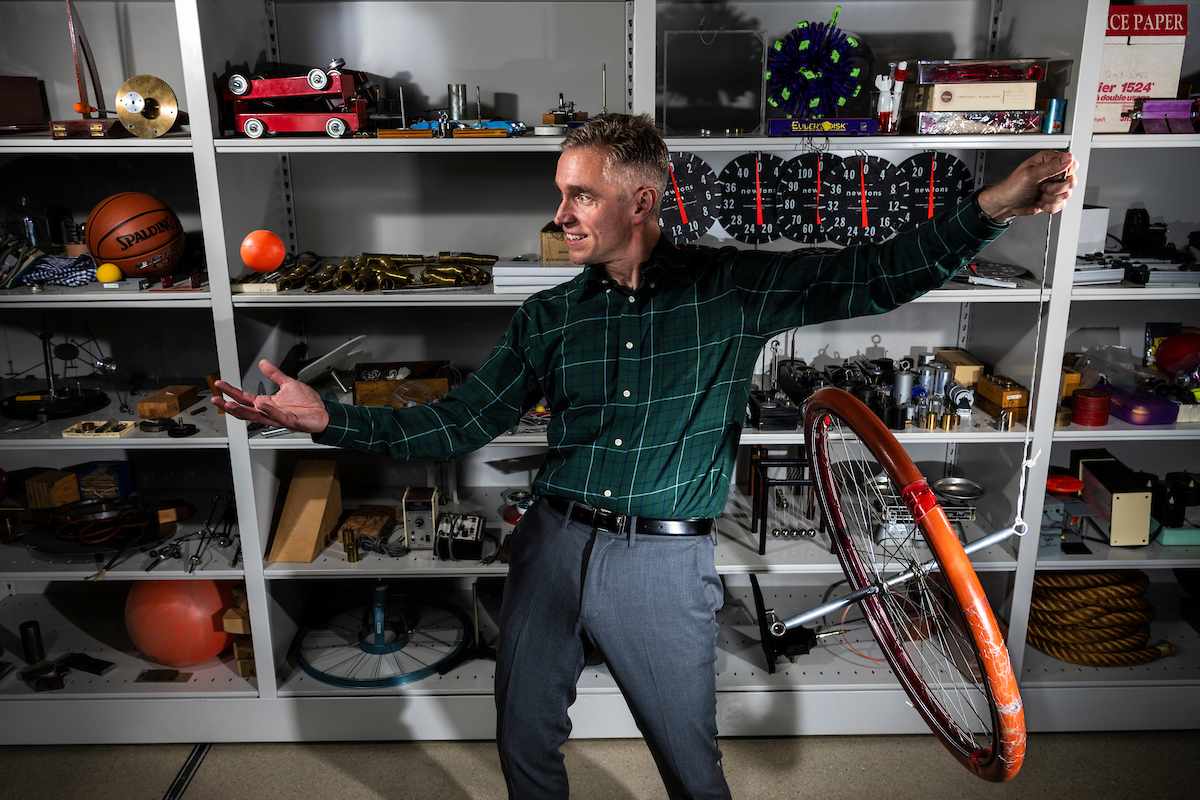
Astrophysicist and September Instructor of the Month Erik Rosolowsky uses some demonstrations of physics principles he'll share with students this year. Photo credit: John Ulan
It's the start of a new fall semester and classes are underway once more. As students fill the hallways, each month we take the opportunity to highlight one of the exceptional instructors in the Faculty of Science: beginning with our September Instructor of the Month, astrophysicist Erik Rosolowsky.
Rosolowsky was one of the first in the Department of Physics to virtually "flip" his first-year physics classes, with almost two-thirds of class time spent in an interactive learning environment. Now, he shares his perspective on teaching, learning, and how the best way to learn physics is to jump in and experience it.
What do you teach?
I'm currently teaching PHYS 124 Particles and Waves, which explores two types of motion and provides a foundation in physics concepts. I've also spent a lot of time over the years teaching ASTRO 120 - Astronomy of the Solar System and ASTRO 320 - Stellar Astrophysics I. ASTRO 120 examines the origin, evolution, and nature of Earth and the other bodies of our solar system, while 320 covers the formation and evolution of stars-illustrating how physics apply in the formation of our universe. I'm also the director of the undergraduate lab program in physics, where I work on integrating the lab and lecture curriculum for first-year physics courses.
"Physics is the closest thing we have to an oracle. We've harnessed math to literally predict the future, and it works surprisingly well." -Erik Rosolowsky
Why should people learn about this subject?
Physics is the closest thing we have to an oracle. We've harnessed math to literally predict the future, and it works surprisingly well. Even in cases when it doesn't work so well, we end up learning more about how the universe works, and that enables us to keep expanding our understanding.
What's the coolest thing about this field?
I love how physics allows us to tell an incredibly detailed story of how the universe changes over cosmic time, even though the depths of time and space utterly dwarf the limited human perspective.
What was your favourite learning experience as an undergrad? How do you incorporate that experience into teaching your students?
When I was an undergraduate student, I took a few small classes that were structured as student-led seminars. We'd have to learn material on our own and then try to teach it to each other. In doing so, we'd develop questions about everything we'd explore. With the professor, we'd talk through and come to answers on some questions-while others stubbornly remained difficult to answer. Now that I'm a professor, I love running small classes in that format-but even in the largest lecture classes, I always try to encourage students to explore material on their own and pose questions based on that exploration.
What was it that drew you to this field?
Like many astronomers, I always loved the dark night sky growing up, but what really cinched it was my first astrophysics problem set as an undergraduate student. I spent 10 hours doing "boring" unit conversions and just loved it. I thought that if that was how much I enjoyed the supposedly dull stuff, this would probably be the right field to study.
What do you feel is the most important piece of advice you give to your students?
Physics is a skill more than just a body of knowledge. You can't just watch physics to learn it-you need to jump in and experience it to really understand it.
What would people be surprised to know about you?
My lowest grades in junior high school were in physics.